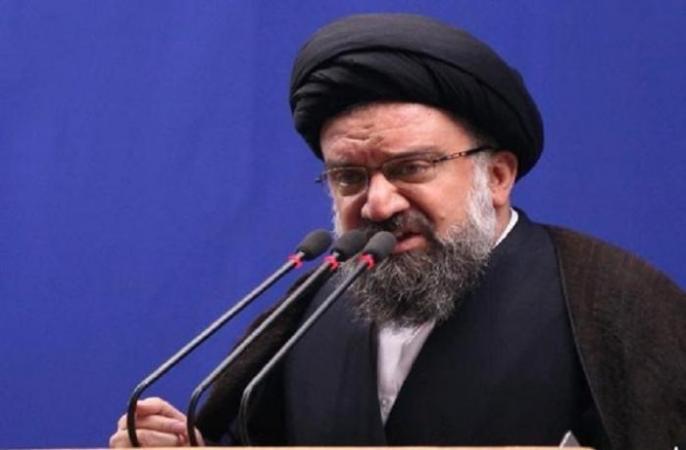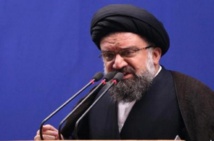"Particularly those burning flags should get the highest possible penalty," said the senior member of the Assembly of Experts, the country's most senior clerical committee.
Protestors have taken to the streets across the nation since December 28 to rally against economic issues, Tehran's Middle East policies and the country's religious establishment.
In an effort to show that they still have the backing of the population, the regime began demonstrations in Tehran following Friday prayers.
In Tehran, tens of thousands took part in the rallies, while hundreds of thousands participated nationwide.
Several of these protests quickly turned into anti-Rowhani demonstrations, with people also demanding the death penalty for those who were detained during rallies earlier in the week.
The reformists in Iran's parliament have demanded proper legal assistance for the people who have been arrested for protesting against the regime.
"It is our legislative duty, especially towards the students, to provide the appropriate legal assistance," lawmaker Fatemeh Saeidi said on Friday.
The reformists plan to put forward a motion for an urgent session of parliament within the next 24 hours, ISNA news agency quoted Saeidi as saying.
She said she was disturbed by calls from hardliners for harsh punishments and even the death penalty for the protesters, and demanded a special parliamentary commission to look into the fate of the students in police and secret service custody.
Around 42,000 people have taken part in protests criticizing the clerical regime so far, while hundreds of thousands are taking part in rallies supporting the establishment, according to the Interior Ministry.
In elections, the situation looks very different. In the last four years candidates close to the clergy have lost four important elections to reformists.
Many inhabitants of the capital city are worried that it could come to clashes between supporters and opponents of the regime, but there were no reports of violent encounters so far.
The death toll from the demonstrations stood at 19 by Wednesday, with reports of up to 1,000 arrests nationwide.
The UN Security Council plans to hold closed consultations ahead of the public emergency meeting on Iranian protests on Friday afternoon.
A public meeting was scheduled at the request of the US delegation to the United Nations.
But the last-minute addition of the private consultations, reportedly requested by Russia, signals that there could be disagreement over whether to hold the meeting on Iran at all.
"It will be telling if any country tries to deny the Security Council from even having this discussion, just as the Iranian regime tries to deny its own people the ability to have their voices heard," US ambassador to the UN Nikki Haley said in a statement announcing the meeting late Thursday.
Tayé-Brook Zerihoun, one of the UN's deputy chiefs for political affairs, is due to brief the council, a spokesman for UN Secretary General Antonio Guterres told reporters.
Supreme Leader Ayatollah Ali Khamenei has accused Iran's foes - usually a reference to the United States and Israel - of fomenting the protests, while President Rowhani has insisted it would be a mistake to blame the movement on a foreign conspiracy.
European Commission President Jean-Claude Juncker on Friday warned against "giving the impression of meddling from the outside, in an abnormal way, in the internal affairs of Iran," while stressing that the European Union was keeping a close eye on developments.
He appeared critical of US President Donald Trump's call for change in Iran, noting: "Diplomacy is the art of tactfulness."
Trump tweeted in support of the Iranian people several times this week, promising Iranians support from the US and demanding the regime not harm protesters.
Iranian authorities including the commander of the country's paramilitary Revolutionary Guard have threatened anti-regime protesters with strict penalties.
Many Iranian analysts say the first protests, which were directed at the country's economic conditions, were organized by Rowhani's opponents.
The rallies backfired, however, and most protests have since been directed at the entire leadership of the country, including the religious establishment.
---------------------------------------------------------------------------------------------------------------------
Protestors have taken to the streets across the nation since December 28 to rally against economic issues, Tehran's Middle East policies and the country's religious establishment.
In an effort to show that they still have the backing of the population, the regime began demonstrations in Tehran following Friday prayers.
In Tehran, tens of thousands took part in the rallies, while hundreds of thousands participated nationwide.
Several of these protests quickly turned into anti-Rowhani demonstrations, with people also demanding the death penalty for those who were detained during rallies earlier in the week.
The reformists in Iran's parliament have demanded proper legal assistance for the people who have been arrested for protesting against the regime.
"It is our legislative duty, especially towards the students, to provide the appropriate legal assistance," lawmaker Fatemeh Saeidi said on Friday.
The reformists plan to put forward a motion for an urgent session of parliament within the next 24 hours, ISNA news agency quoted Saeidi as saying.
She said she was disturbed by calls from hardliners for harsh punishments and even the death penalty for the protesters, and demanded a special parliamentary commission to look into the fate of the students in police and secret service custody.
Around 42,000 people have taken part in protests criticizing the clerical regime so far, while hundreds of thousands are taking part in rallies supporting the establishment, according to the Interior Ministry.
In elections, the situation looks very different. In the last four years candidates close to the clergy have lost four important elections to reformists.
Many inhabitants of the capital city are worried that it could come to clashes between supporters and opponents of the regime, but there were no reports of violent encounters so far.
The death toll from the demonstrations stood at 19 by Wednesday, with reports of up to 1,000 arrests nationwide.
The UN Security Council plans to hold closed consultations ahead of the public emergency meeting on Iranian protests on Friday afternoon.
A public meeting was scheduled at the request of the US delegation to the United Nations.
But the last-minute addition of the private consultations, reportedly requested by Russia, signals that there could be disagreement over whether to hold the meeting on Iran at all.
"It will be telling if any country tries to deny the Security Council from even having this discussion, just as the Iranian regime tries to deny its own people the ability to have their voices heard," US ambassador to the UN Nikki Haley said in a statement announcing the meeting late Thursday.
Tayé-Brook Zerihoun, one of the UN's deputy chiefs for political affairs, is due to brief the council, a spokesman for UN Secretary General Antonio Guterres told reporters.
Supreme Leader Ayatollah Ali Khamenei has accused Iran's foes - usually a reference to the United States and Israel - of fomenting the protests, while President Rowhani has insisted it would be a mistake to blame the movement on a foreign conspiracy.
European Commission President Jean-Claude Juncker on Friday warned against "giving the impression of meddling from the outside, in an abnormal way, in the internal affairs of Iran," while stressing that the European Union was keeping a close eye on developments.
He appeared critical of US President Donald Trump's call for change in Iran, noting: "Diplomacy is the art of tactfulness."
Trump tweeted in support of the Iranian people several times this week, promising Iranians support from the US and demanding the regime not harm protesters.
Iranian authorities including the commander of the country's paramilitary Revolutionary Guard have threatened anti-regime protesters with strict penalties.
Many Iranian analysts say the first protests, which were directed at the country's economic conditions, were organized by Rowhani's opponents.
The rallies backfired, however, and most protests have since been directed at the entire leadership of the country, including the religious establishment.
---------------------------------------------------------------------------------------------------------------------









 Home
Home Politics
Politics











